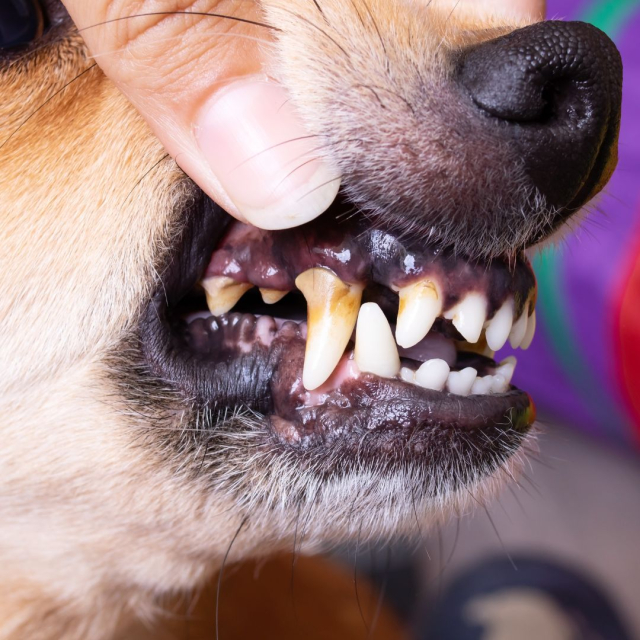Dental care is crucial to dogs' overall health, but is often overlooked. Dental tartar can cause a number of health problems in dogs, from bad breath to serious diseases such as gingivitis and periodontitis.
1. Importance of Dental Care in Dogs
Before getting into the specific tips, it is essential to understand why dental care is so important for your dog. Tartar buildup not only affects your pet's oral health, but it can also lead to systemic problems. Bacteria present in the mouth can enter the bloodstream and affect vital organs such as the heart, liver and kidneys.
2. Identification of Dental Tartar
Tartar is a buildup of dental plaque that has hardened over time. Here we give you some signs to identify the presence of tartar in your dog:
Coloration: Tartar usually appears as yellow or brown spots on the teeth.
Bad Breath: A common sign of tartar and periodontal disease is persistent bad breath.
Swollen Gums: Red, swollen or bleeding gums are an indication of dental problems.
Loss of Appetite: If your dog avoids eating or has difficulty chewing, it may be due to dental pain.
3. Regular Tooth Brushing
Regular brushing is the most effective way to prevent tartar buildup. Here are some tips to do it correctly:
Frequency: Ideally, you should brush your dog's teeth every day. If this is not possible, try to do it at least three times a week.
Toothbrush and Toothpaste: Use a dog-specific toothbrush and toothpaste designed for dogs. Never use human toothpaste, as it can be toxic to dogs.
Technique: Brush with gentle, circular movements, paying special attention to the gum line where most plaque accumulates.
4. Dental Foods and Treats
Dental foods and treats can help reduce plaque and tartar buildup. These treats are designed to clean your dog's teeth while he chews. Some recommended options include:
Kibble: Dry food is better than wet food for dental health, as the chewing process helps remove plaque.
Dental Treats: There are many dental treats on the market that are formulated to reduce plaque and tartar.
5. Chewable Toys
Chew toys are not only fun for your dog, but they are also a great tool for keeping their teeth clean. By chewing, dogs can remove some of the dental plaque. Here we leave you some recommendations:
Safe Materials: Make sure toys are made of safe and durable materials.
Texture: Toys with rough surfaces or nodules are especially good for cleaning teeth.
6. Regular Visits to the Veterinarian
Regular dental checkups with the veterinarian are essential for your dog's dental health. A veterinarian can perform professional dental cleanings and detect any dental problems in their early stages. A visit to the vet at least once a year is recommended, although some dogs may need more frequent visits depending on their dental health.
7. Dental Supplements
There are specific supplements you can add to your dog's water or food to help keep his teeth clean. These supplements usually contain ingredients that reduce the formation of plaque and tartar.
8. Professional Cleaning
If tartar has already built up significantly, you may need a professional dental cleaning by a veterinarian. This procedure involves removing tartar with specialized tools and is often performed under general anesthesia to ensure the dog is comfortable and pain-free.
9. Diet and Nutrition
Your dog's diet plays a crucial role in his dental health. Here are some dietary tips to prevent tartar:
Dry Foods vs. Wet: As mentioned above, dry food is better for dental health than wet food.
Balanced Diets: A balanced, nutrient-rich diet helps keep your dog's immune system strong and able to fight infections.
Avoid Sugar: Do not give your dog foods that contain sugar, as this can contribute to the formation of plaque.
10. Natural Products
You can also consider using natural products to clean your dog's teeth. Some pet owners use coconut oil or baking soda as a natural alternative for brushing their dogs' teeth. However, it is important to consult with your veterinarian before using these products to make sure they are safe and effective.
11. Educate Yourself and Educate Others
Education is key to dog dental care. Educate yourself on best practices and share this information with other pet owners. Many dental problems in dogs are avoidable with proper care and continued education.
12. Adaptation and Patience
Some dogs may be reluctant to brush their teeth at first. Here are some strategies to adapt them to dental care:
Graduality: Start slowly, allowing your dog to get used to the toothbrush and toothpaste.
Positive Reinforcement: Use rewards and praise to encourage your dog's cooperation during grooming.
Consistency: Consistency is key. Make brushing a daily routine so that your dog accepts it as part of his daily life.
13. Signs of Dental Problems
It is crucial to watch for signs of dental problems in your dog. Some of these signs include:
Difficulty Eating: If your dog has difficulty chewing or shows pain when eating, it may be an indication of dental problems.
Bleeding Gums: Gums that bleed easily can be a sign of gingivitis or periodontitis.
Loose Teeth: Loose or fallen teeth are a sign of advanced periodontal disease.
14. Prevention is the Key
Prevention is always better than treatment. Maintaining a consistent and proactive dental care routine will help prevent tartar buildup and other dental problems in your dog.
Your dog's dental care is an essential aspect of his overall health. By following these tips and maintaining a regular dental care routine, you can help prevent tartar buildup and ensure your dog has a healthy, happy life. Remember that collaboration with your veterinarian is crucial to effectively address any dental issues and ensure your pet receives the best care possible.
